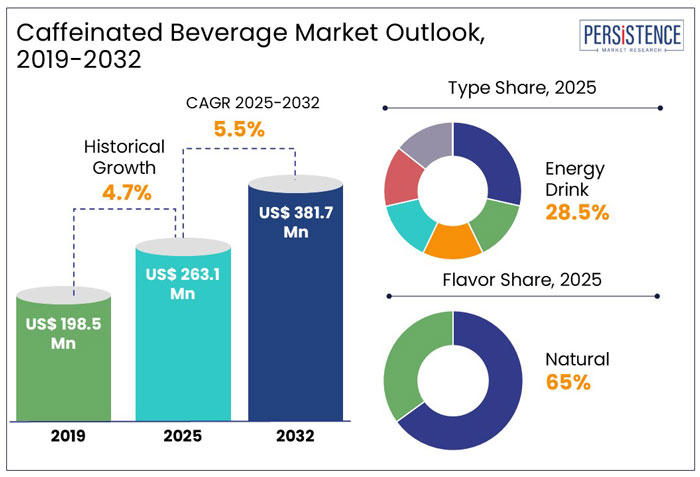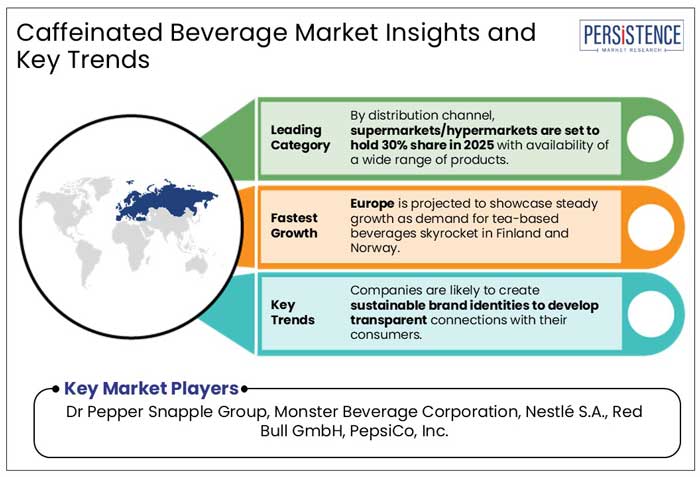Industry: Food and Beverages
Published Date: February-2025
Format: PPT*, PDF, EXCEL
Delivery Timelines: Contact Sales
Number of Pages: 182
Report ID: PMRREP35003
The global caffeinated beverage market size is anticipated to reach a value of US$ 263.1 Mn in 2025 and is set to witness a CAGR of 5.5% from 2025 to 2032. The market will likely attain a value of US$ 381.7 Mn in 2032.
Professionals who work long or unusual hours frequently view caffeine as being just as important as breath, and studies have indicated that it may help avoid certain diseases. Most adults can take up to 400 mg of caffeine each day without experiencing any negative health effects.
In addition to the social aspects, its consumption is high for its effects, which include taste, enhanced attention, and greater physical vitality. Fast-acting caffeinated beverages like energy drinks, coffee-based beverages, and sports drinks are showcasing high demand among athletes and working professionals as these give a quick energy boost. Slow-acting beverages like green tea and matcha tea are becoming immensely popular among tea aficionados and millennials.

Key Highlights of the Caffeinated Beverage Industry
|
Global Market Attributes |
Key Insights |
|
Caffeinated Beverage Market Size (2025E) |
US$ 263.1 Mn |
|
Market Value Forecast (2032F) |
US$ 381.7 Mn |
|
Projected Growth (CAGR 2025 to 2032) |
5.5% |
|
Historical Market Growth (CAGR 2019 to 2024) |
4.7% |
Historical Period Made Companies Realize that a Brand Cannot Sustain on Hype Alone
In the historical period from 2019 to 2024, the global caffeinated beverage industry witnessed a CAGR of 4.7%. The industry saw ups and downs during this period with the emergence as well as the downfall of certain caffeinated beverage brands. One such example is American influencer Logan Paul’s Prime. In the U.K., Prime Hydration drink was introduced in June 2022, whereas the Prime Energy drink was launched in January 2023.
The beverage which branched out to include caffeine-filled energy beverages that cost less than US$ 2.50 per can, was listed for 1,200 British pounds, or around US$ 1,500, on resale websites. It had created a buzz across the U.K. as dozens of high-spirited tweens and their parents crammed themselves into supermarket aisles, carrying bottles of vibrant Prime into their arms. In fact, to prevent theft, shops had to apply security labels to individual bottles of a new strawberry watermelon flavor in summer as it was immensely popular.
However, less than a year after the commotion, Prime had gone from predicted 2023 sales of US$ 1.2 Bn to a product that stores could hardly sell. Factors like high caffeine content, lack of sustainable marketing strategy, and overreliance on social media hype led to its downfall by the end of 2024.
Key players in the industry soon realized that focusing on creating a sustainable brand identity beyond hype is very important. They are anticipated to build a transparent connection with their customers instead of solely relying on influencer marketing as well as prioritizing long-term strategies over quick revenues.
Sweeping Café Culture to Rise Globally, Propelling Caffeinated Beverage Demand
From 2025 to 2032, the caffeinated beverage industry is likely to showcase a CAGR of 5.5%. With rising inclination of health-conscious consumers toward caffeinated beverages that are low in calories and sugar but high in other beneficial ingredients, the market is projected to open the door to new product formulations.
Coffee-based beverages are predicted to gain traction in the foreseeable future with the rising café culture, trend for personalized flavors, demand for ready-to-drink options, and availability of a wide range of coffee options. As per Persistence Market Research, the sweeping café culture, which is the latest trend in the market, is set to take center stage through 2032.
It has recently entered India and is projected to transform the growth trajectory of coffee as well as the beverages infused with it. Inspired by global performances in places like New York and Los Angeles, several DJs in India are now organizing cozy events in coffee shops. Such events are being held between 6 pm and 7 pm, which, as per coffee shop owners, is the ideal time for coffee dates.
These events are mainly catering to those people who don’t want to consume alcohol but also relax after work with a cup of hot coffee. With vivid trends gaining popularity worldwide, demand for caffeinated beverages is set to surge from 2025 to 2032.
Growth Drivers
Rising Shift toward Bottled and Canned Tea to Boost Demand in the Market
Increasing demand for functional beverages is anticipated to augment the global caffeinated beverage market in the forecast period. Bottled and canned tea is gaining traction due to its high convenience. Compared to sugary beverages, bottled and canned tea is considered a healthier option, especially when it is marketed with potential health benefits like antioxidants and natural ingredients.
Consumers with hectic schedules are mainly inclining toward this type of tea as it is ideal for on-the-go consumption and requires no preparation. Key companies are also focusing on investing in the launch of all-natural products in the canned and bottled tea segment to enhance its appeal. For example,
Product Recalls due to High Caffeine Levels May Negatively Impact Brand Reputation and Sales
When taken in excess, caffeine can be dangerous as it is a stimulant that can cause negative effects like anxiety, elevated heart rate, insomnia, restlessness, jitters, upset stomach, and headaches, especially in people who are sensitive to its effects. Stopping a high caffeine intake suddenly can also cause withdrawal symptoms like headaches and exhaustion.
Governments worldwide have put forward different norms on the addition of caffein in food and beverages so that it doesn’t exceed the limits. Those found with excessive levels of caffein are usually recalled. For example,
Product recalls in the industry are anticipated to negatively impact a company’s reputation, thereby impacting stock prices, eroding consumer confidence, incurring financial costs, and leading to lost sales.
Companies to Launch Non-conventional Caffeinated Drinks like Sparkling Coffee and Matcha Tea
Consumer preferences have changed because of beverage manufacturers providing caffeinated alternatives such as ready-to-drink tea or coffee and energy drinks in a variety of flavors, functional mixes, and reduced caffeine. Beverage manufacturers are projected to launch unique flavored drinks to cater to changing consumer preferences.
Companies are set to capitalize on the rising demand for functional botanical blends and single-estate pure leaf teas. They are also estimated to introduce sparkling coffee, canned cold brew, and matcha tea with new flavors. Sparkling espresso tonics in flavors like cranberry, blood orange, and grapefruit are gaining momentum.
Type Insights
Increasing Preference for Instant Energy and Carbonated Drinks Supported by Marketing Strategies and Diverse Offerings
Caffeinated energy drinks are estimated to hold a share of 28.5% in 2025. Often marketed with appealing flavors and convenient packaging, these energy drinks are gaining momentum as they are said to give a quick boost of energy and alertness due to their high caffeine content. It can help people feel more focused, awake, and perform better mentally and physically, especially when they are feeling tired or needing to stay up late.
Carbonated soft drinks are projected to gain traction in the forecast period due to their unique sensory experience, such as the fizzy sensation from carbonation, which many people find refreshing and enjoyable. Easy accessibility, portable packaging, a variety of flavor options, successful marketing campaigns, and a growing trend toward healthy alternatives like low-sugar and diet options further contribute to high popularity of carbonated soft drinks. For instance,
Introduction of unique campaigns is anticipated to help carbonated beverage brands to attract consumers, thereby increasing sales worldwide.

Expanding Market for Natural Caffeine Beverages Fueled by Clean Label and Plant-based Trends
Natural flavor is projected to account for 65% of the caffeinated beverage market share in 2025. Consumers' rising emphasis on health and wellness is bolstering demand for natural caffeine-based beverages. Various companies are now using guarana seeds as these contain nearly four times as much caffein as coffee beans.
In Latin America, Brazil is considered the world's most prominent producer of guarana. The Brazilian states of Amazonas and Bahia are home to 96% of all guarana plantations. Extracts from the plant's seeds are employed in the energy drink market, particularly as the basic aroma in a line of carbonated beverage products.
Synthetic caffeine, on the other hand, is made in a laboratory, unlike natural caffeine, which is derived from foods found in nature. It is frequently added to packaged drinks such as energy drinks, soda, and juice. Chemicals and solvents that may be hazardous to human health and the environment are used in the manufacturing of synthetic caffeine, thereby hampering demand.
Europe Caffeinated Beverage Market
Europe’s Deep-rooted Coffee Culture Emphasizing Strong Brews to Create Opportunities
In 2025, Europe is projected to hold about 24.3% of share. The region is home to several coffee drinkers, especially in Finland, Norway, Iceland, and Denmark. Coffee has a long history of consumption in these countries, where people prefer strong espresso-based drinks and view coffee as a part of their daily routine rather than just a beverage. For example,
Coffee played an important role in European history by promoting social interaction and intellectual exchange through the rise of coffee houses, which developed into gathering places for writers, artists, and thinkers. By offering a forum for candid conversation and idea sharing, these enabled people from all walks of life to engage in intellectual discourse, resulting in a new degree of social engagement. Hence, historical influence, social aspects, and expresso preference are projected to create opportunities for caffeinated beverage companies in Europe.
Middle East and Africa Caffeinated Beverage Market
Companies to Target Türkiye and Kuwait to Launch Tea-based Beverages
In the Middle East and Africa, demand for tea-based beverages is projected to surge steadily through 2032. With an average of almost seven pounds of tea per person annually, Türkiye has the highest tea consumption per person in the world.
Tea serving and drinking are strongly rooted customs and etiquette in Turkish society. Tea is more than just a drink; it is a social interaction staple and a sign of hospitality. It is also an essential part of the country’s hospitality, whether it is served in a busy tea house or a comfortable home. Several companies in the Middle East are hence focusing on broadening their presence in Türkiye by launching new tea-based beverages. For example,
In Kuwait, tea is usually preferred strong, black, and heavily sweetened, and declining a cup can be interpreted as impolite. To provide a unique taste profile, several brands have launched in Kuwait with their own tea-based beverages. They are also striving to maintain high quality and safety in their products. For example,
North America Caffeinated Beverage Market
Sports and Energy Drinks to Gain Impetus in the U.S. with Access to Innovative Formulations
In North America, the U.S. caffeinated beverage market is projected to showcase a steady growth rate through 2032. Caffeinated beverages like sports drinks and energy drinks are gaining momentum in the U.S. due to rising demand from consumers who are shifting toward fitness-related activities to maintain their health and well-being. In 2024, for example, the U.S. consumed 29.69 liters of energy and sports drinks per person, which is more than any other country.
Frequent product innovations, extensive distribution networks, and strong brand presence are also creating a high demand for these drinks in the U.S. Brands are focusing on joining hands with sports teams and experts to come up with innovative formulations. For example,
The global caffeinated beverage industry is highly competitive with the presence of several renowned companies. They are mainly focusing on responding to evolving consumer preferences by coming up with functional beverages, health-conscious options, and innovative flavors. A few other companies are sourcing their ingredients responsibly, enhancing the efficiency of water use, and lowering packaging waste.
For instance, Good Earth U.K. provides Good Earth Energy, its natural energy drink containing 80mg of natural caffeine, which is equivalent to a cup of coffee. It is sourced from an Ecuadorian leaf called Guayusa, which is mixed with vitamins and organic fruit juices. In the coming years, key players are likely to focus on launching similar products that would appeal to consumers who might otherwise question the levels of caffeine present in a product.
Key Industry Developments
|
Report Attributes |
Details |
|
Historical Data/Actuals |
2019 - 2024 |
|
Forecast Period |
2025 - 2032 |
|
Market Analysis Units |
Value: US$ Bn/Mn, Volume: As applicable |
|
Geographical Coverage |
|
|
Segmental Coverage |
|
|
Competitive Analysis |
|
|
Report Highlights |
|
|
Customization and Pricing |
Available upon request |
By Type
By Flavor
By Distribution Channel
By Region
To know more about delivery timeline for this report Contact Sales

The market is set to reach a value of US$ 381.7 Mn in 2032.
Dr Pepper Snapple Group, Monster Beverage Corporation, and Nestlé S.A. are a few leading brands.
The industry is projected to witness a CAGR of 4.7% through 2032.
In 2025, Europe is projected to hold about 24.3% of share.
Natural flavor is anticipated to gain momentum globally.